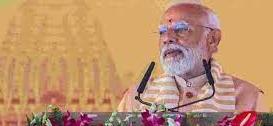
Modi's speech - and the narrative the opposition should adopt
text_fieldsIn the run-up to the general elections, BJP's leaders keep asserting that they will win 370 seats for themselves and 400 for the front, which is part of a pre-election psychological warfare. Prime Minister Narendra Modi's speech at the party's national council meeting on Sunday echoed the same tone. The healthy functioning of democracy can only be ensured if the opposition is ready to oppose the claims made in the speech at the party's meeting by the Prime Minister which is likely to mislead the voters. If the Prime Minister's speech is scrutinised as due, the voters will be in a position to decide whether to give another chance to the BJP. For some time now, the prime minister and the party leadership have been going whole hog hog with a comparison of the Modi regime's performance with that of the six-and-a-half decades since independence that preceded the BJP. The claim issued in the field of science and technology is a case in point. The implicit claim that they are the ones who raised India's reputation in this field is misleading. India's proud IITs are higher technical education institutes that were started with foresight and vision during Nehru's time. And those who claim India's leap in space exploration as if that were an achievement of their government, hide the fact that the country started this journey in 1962 with the available technology back in the day.
Another claim is that in the last ten years, they had a spotless, scam-free governance. Modi is given to mocking the UPA regime citing 2-G spectrum corruption and irregularities. Although that case of corruption cannot be denied, it was clear even when the court verdict came against the government that the figures given by the CAG at that time were inflated in the matter of spectrum allocation. But then under the NDA regime, many such big contracts and privatizations are done in the pattern of favouring the dear ones. The telecom sector fell into the hands of private companies partly because of inadequate enforcement of anti-monopoly laws but also as a result of attempts to emasculate BSNL, then a sterling public sector asset. Rapid growth achieved in an industry will again provide capital for further investment. And when big ticket tenders are floated, only such capital powers can compete on the terms. Reliance won the majority of the 5G spectrum auction. Today, the government proudly showcases the activities of a 'developed India' that can only be achieved through this kind of growth which is a symptom of crony capitalism. If the names of those who donated to the BJP, the party that received most of the total donations through election bonds, are revealed on the Election Commission's website as mandated in the Supreme Court's recent order, many opaque transactions stand the chance of being unravelled.
Modi also claimed that he was the first to speak about toilets in Parliament, the obvious reference being to the much-publicized Swachh Bharat scheme. However, apart from the huge budget allocation, looking at the number and condition of latrines actually set up and the percentage of open defecation-free locations, it has made little difference. Another issue is Modi's allegation that when the BJP won the assembly elections in some northern states, the opposition took to fueling south-north divide. This tactic is to paint opposition-ruled southern states as sectarian while taking a hostile approach. It is akin to accusing opposition of promoting casteism when they demand caste survey for equitable distribution of opportunities. The BJP leadership claims that only they can provide stability and peace and keep pointing at the scattered opposition. But then strangely enough, the prime minister envisions 'Ek Bharat Shrestha Bharat' ' at the same time leaving the country's largest minority completely insecure and depriving them of their rights. In this perspective, when asking for another mandate, the vision of the party for the next five years should also be looked at. If the party moves forward from agenda like construction of Ram Temple after the demolition of Babri i Masjid at the same site, the implementation of a Uniform Civil Code in a few states after abolishing personal laws, the abrogation of Jammu and Kashmir's special rights, how does the party envisage building a peaceful society moving forward with further divisive agenda like attempts to gradually deprive a minority of citizenship and the removal of the status of minority educational institutions? What guarantee would be given to such a large oppressed minority? Will the BJP recognize that fair and reasonable rights are the prerequisite for an internally secure nation and that otherwise conflict is the permanent spectacle of the nation? That, however, would deny the very nature of the BJP. But until that happens, everything else will only result in temporary electoral victories and jubilations in its name. It is time the opposition also formulated its strategy that recognize this.

























